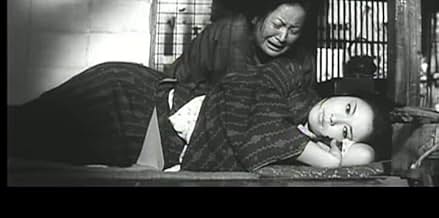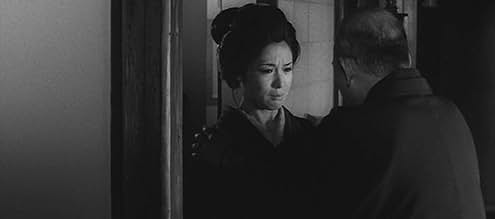अपनी भाषा में प्लॉट जोड़ेंOn the eve of the Russo-Japanese war at the beginning of the 20th century, small-town girl Okane has married an old wealthy man to escape a life of poverty.On the eve of the Russo-Japanese war at the beginning of the 20th century, small-town girl Okane has married an old wealthy man to escape a life of poverty.On the eve of the Russo-Japanese war at the beginning of the 20th century, small-town girl Okane has married an old wealthy man to escape a life of poverty.
- पुरस्कार
- कुल 3 जीत
फ़ीचर्ड समीक्षाएं
This film essentially starts out just prior to the Russo-Japanese War with a beautiful young woman by the name of "Okane" (Ayako Wakao) having been sold to a wealthy old man by her parents in order to pay a debt. Although she doesn't actually love him she performs her duties in an admirable manner and because of that she is given a reasonable amount of money by his family when he passes away. So when her father also dies not long afterward she uses a portion of that money to relocate back to the small village she left several years earlier. However, the villagers all look down upon her because of her previous situation and as a result she becomes quite bitter and lonely. This situation changes, however, when the most popular person in the village named "Seisaku" (Takahiro Tamura) falls madly in love with her-and she returns that affection many times over. Unfortunately, having experienced the depths of loneliness previously neither are prepared for what happens when he is called upon to serve in the army and she is left alone with villagers who still despise her. Now rather than reveal any more I will just say that this was an interesting film which was greatly enhanced by a remarkable plot, good camera work and the incredible beauty of Ayako Wakao. Admittedly, there were a couple of scenes where the acting was a bit over-the-top but all things considered I enjoyed this movie and I have rated it accordingly.
An astonishing film in terms of it's relentless power to both shock and move. It has a quick and melodic pace, something rather uncommon for films of the time. It gets moving straight away and sets us in a world of misplaced honor and preconceptions. Wakao is simply stunning in both her looks and talent. She plays a beaten down woman with a lot of spite, but equal amounts of heart. After the death of her sugar daddy, she returns to her home village where she is seen as tainted goods. It isn't long before a role model soldier returns to the village and, against the wishes of the townsfolk, sets his sites on the outcast. The two both seem to be rebelling against society, but also do have genuine affection for each other. It isn't something that is easy to pull off. By the time the violent third comes around it is a disturbing act of love that perfectly sums up the complex themes running around. This film is unforgettable and I would even recommend it to those that find early Asian cinema a bit slow. Hopefully, this could open some doors.
This is a desperate story of how love can drive people to extremes to hold on to the ones they love and keep them safe. It's also a condemnation of Japanese militarism and small town bigotry. The violence when it comes is quite shocking but wholly appropriate to the story. It's one of the most real love stories you'll ever see on film.
Ayako Wakao was sold to a rich kimono merchant, who lavished everything on her. Now he's dead. She has returned to her village, where everyone despises her because of her past, except for Takahiro Tamura. They fall into lust and common-law marriage because his mother doesn't approve. He's the role-model soldier for village, and the Russo-Japanese War is about to begin. When he gets sent off to the assault on Port Arthur, the village goes back to treating her like dirt, until word comes that Tamura was injured, is in hospital, and will be given a week's leave She doesn't want him to go.
It's a movie that combines two two Japanese elements that look absolutely bonkers to a foreigner. First, of course, is the way everyone salutes the Emperor and is thrilled that Tamura has a chance to die; one of the characters says that a real hero is one who dies. The other is the sort of obsessive love that makes someone mutilate the object of their desire.
Well, it baffles me, if not all foreigners. Some people are weird.
It's stunningly performed and directed by Yasuzô Masumura, a leading light of the Japanese New Wave. As someone who decried Old Japan and New Japan, I think this expresses his disapproval of both.
It's a movie that combines two two Japanese elements that look absolutely bonkers to a foreigner. First, of course, is the way everyone salutes the Emperor and is thrilled that Tamura has a chance to die; one of the characters says that a real hero is one who dies. The other is the sort of obsessive love that makes someone mutilate the object of their desire.
Well, it baffles me, if not all foreigners. Some people are weird.
It's stunningly performed and directed by Yasuzô Masumura, a leading light of the Japanese New Wave. As someone who decried Old Japan and New Japan, I think this expresses his disapproval of both.
An absolutely Masterpiece from a great underrated director, who worked as assistant of Mizoguchi and his films, like those of his master's, are contemplative, although not such slow. Seisaku's Wife tells a rich and impressive story about an inevitable love in contradiction to military honor. You can see desperate life instinct in the age of imperial deadly values. This dichotomy, of course, is not unfamiliar in Japanese classic cinema: Naruse's Floating Clouds and, even more, Suzuki's Story of a Prostitute (also made in 1965) showed the same contradiction. But I found Masumura's movie stronger: Majestic pictures, simple but splendid music, and excellent performances.
It is strongly recommended, especially if you love infinite golden heritage of Japanese studio cinema.
क्या आपको पता है
- कनेक्शनRemake of Seisaku no tsuma (1924)
टॉप पसंद
रेटिंग देने के लिए साइन-इन करें और वैयक्तिकृत सुझावों के लिए वॉचलिस्ट करें
2025 New York Film Festival Guide
2025 New York Film Festival Guide
See the current lineup for the 63rd New York Film Festival.
विवरण
- रिलीज़ की तारीख़
- कंट्री ऑफ़ ओरिजिन
- भाषा
- इस रूप में भी जाना जाता है
- Seisaku's Wife
- उत्पादन कंपनी
- IMDbPro पर और कंपनी क्रेडिट देखें
- चलने की अवधि
- 1 घं 33 मि(93 min)
- रंग
- ध्वनि मिश्रण
- पक्ष अनुपात
- 2.35 : 1
इस पेज में योगदान दें
किसी बदलाव का सुझाव दें या अनुपलब्ध कॉन्टेंट जोड़ें




















